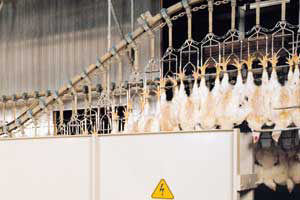UK: BVA questions new poultry slaughter regulations

The British Veterinary Association (BVA) has raised an urgent question with government body Defra over new slaughter regulations for England that are due to come into force on 5th November.
Although BVA has broadly welcomed the Welfare of Animals at the Time of Killing (WATOK) Regulations, which contain new provisions to improve welfare at slaughter such as the requirement for large slaughterhouses to have an Animal Welfare Officer and the introduction of Certificates of Competence, it is concerned by Defra’s decision not to include stunning parameters in the legislation for poultry killed ‘in accordance with religious rites’.
Electrical stunning of poultry
European legislation on welfare at slaughter includes rules on stunning following work by the European Food Safety Authority (Efsa) to evaluate parameters for electrical waterbath stunning of poultry. BVA has concluded that there is a high risk that if the parameters in electrical waterbath stunning for poultry killed ‘in accordance with religious rites’ are not correctly set and implemented, a percentage of those birds may be immobilised rather than stunned and therefore still conscious at the time of slaughter, causing avoidable animal suffering.
BVA has previously called for European legislation to be implemented in full through WATOK, and is concerned that removing the requirement for parameters in electrical waterbath stunning removes the legal guarantee for effective stunning before slaughter. BVA has written to Defra to seek urgent clarification on how the new legislation will ensure all poultry are effectively stunned before slaughter, other than those that fall under the derogation for non-stun slaughter.
You may also find interesting:
Welfare – at what cost?
It is clear that when consumers have distanced themselves from agricultural society and live in a wealthy country where food security hasn’t been an issue for decades, animal welfare demands soar.
Omission of parameters
“In the last year we have seen headlines about the inhumane treatment of animals at slaughter and, while these new WATOK regulations are strong in many areas, we are concerned that the omission of specific parameters for electrical waterbath stunning leaves some poultry vulnerable to ineffective stunning,” explained BVA president Sean Wensley.
“It is difficult to see how effective stunning can be assured for all poultry if parameters are not set when poultry are killed in accordance with religious rites. Slaughtermen, Official Veterinarians and Animal Welfare Officers in abattoirs are not able to tell the difference between birds that have been effectively stunned and those that are just electro-immobilised, thus compromising the animal welfare standards that these regulations are being put in place to protect.
“Ultimately we need to ensure that all stunning methods are fully effective and we support further research into techniques that will deliver this for every animal without compromise.”












